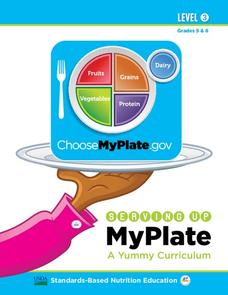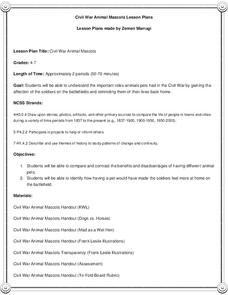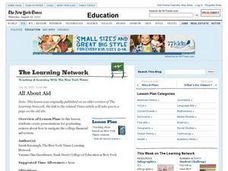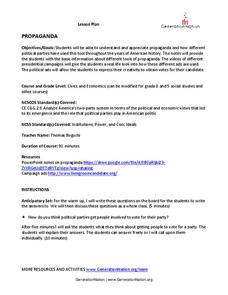EngageNY
Pitching Your Claim with Best Evidence
Does Bud use his rules to survive or thrive? That is the driving question of a lesson plan following the reading of Bud, Not Buddy by Christopher Paul Curtis. In an argument essay prewriting activity, pupils use textual evidence to...
US Department of Agriculture
Serving Up My Plate
Within three nutrition-themed, inquiry-based learning opportunities, pupils take notice of their eating habits; delve deep into the five food groups, gain experience in planning meals, participate in a taste test, and explore ads from...
Echoes & Reflections
Contemporary Antisemitism
Despite the recognized atrocities of the Holocaust, anti-semitism continues. The 11th and final installment of the Teaching the Holocaust series explores the long-term effects of the Holocaust on modern anti-semitism, asking pupils to...
Tellagami Labs
Tellagami
Bring the world of video messaging into your classroom with this creative communication application. Offering the ability to create animations with customized characters, backgrounds, and recorded messages, this resource is guaranteed to...
Civil War Trust
Civil War Animal Mascots
A pet can offer comfort, friendship, and loyalty in the most stressful of situations. Here is a lesson plan that explores the important role animals played during the Civil War. Class members read informative texts, complete a KWL chart,...
Polar Trec
Where in the World Is Our Teacher?
Kirk Beckendorf, a middle school teacher, joined researchers at the McMurdo Station in Antarctica to help maintain automatic weather stations. The instructional activity encourages pupils to track his travels around the region. They...
Prairie Public Broadcasting
Egyptian Pyramids Virtual Field Trip!
A virtual field trip takes enthusiastic travelers to the pyramids of Giza. Using Google, scholars explore the grounds of the ancient pyramids found in Egypt then complete three worksheets: a photo analysis page, a reflection sheet, and a...
Curated OER
SWOT Teams: Analyzing the Political Parties for the 2010 Midterm Elections
What are political parties and what so strategists do? In this political analysis lesson, students analyze political strategies to understand their strengths and weaknesses. They use key details from the text to learn how to create...
The New York Times
Big Brother vs. Little Brother: Updating Orwell's 1984
Government surveillance is an enduring conflict that has become increasingly complex with our nation's use of technology. Add to the understanding of Orwell’s 1984 by using the resources here that display the contemporary actions of Big...
Curated OER
All About Aid
Begin this lesson by estimating the cost of a college education and comparing it to actual data. After reading an article, high school seniors discuss the processes of the college loan corporations. They listen to a lecture about how to...
Echoes & Reflections
The Ghettos
Young historians examine primary sources, including diaries, poems, and photographs, to consider the conditions in the ghettos and how they fit into the escalation of the Third Reich's plot against the Jewish people.
Curated OER
Active Reading with American History
Explore connections within and between informational texts with this lesson about encyclopedia articles. Middle schoolers write encyclopedia articles focusing on topics in American history. They discuss how to determine credibility...
Curated OER
"I" Witness to History
Young journalists write diary entries from the point of view of a person involved in a historical event. They focus on including facts, clear narration, and accurate description of the individual's feelings.
Curated OER
Short and Sweet Science
Readers learn how to summarize scientific text and evaluate the advantages, disadvantages, and challenges in writing summaries. They select science-related articles you've pulled and collected from the New York Times and, with a partner,...
Curated OER
Decoding the First Alphabets: Not as Simple as A, B, C
Explore early writing systems and their significance in understanding the development of past civilizations. In groups, learners research early writing systems and then present their findings to the rest of the class. They teach their...
Echoes & Reflections
Rescuers and Non-Jewish Resistance
What does it mean to be a rescuer during the time of the Holocaust? Learners consider the role of those who resisted the Nazi invasions, including hiding Jewish people, throughout Europe. Activities include listening to the testimony of...
Echoes & Reflections
Studying The Holocaust
While many young scholars are familiar with the Holocaust, they may not understand the specific history that led to the unprecedented atrocity. The first lesson in the unit helps teachers gauge their pupils' background knowledge. A...
Echoes & Reflections
The "Final Solution"
Nazi policies shifted from deportation and imprisonment to extermination of the Jewish people in death camps in the "Final Solution." Learners examine photos of artifacts, read poetry written by survivors, analyze testimony from...
Echoes & Reflections
Timeline of the Holocaust
An interactive timeline uses images, videos, primary source documents, and links to informational text to chronicle the history of the Holocaust from 1933-1945.
Echoes & Reflections
Survivors and Liberators
The end was just the beginning. The period immediately after the end of World War II and the Holocaust is often called "The Return to Life" as survivors looked to reunite and recreate broken families and shattered lives. A two-lesson...
Curated OER
Is It Right to Bear Arms?
Students explore the debate on how to curb gun violence in America. They prepare an argument for or against a strict interpretation of the Second Amendment of the United States Constitution and participate in a debate.
Generation Nation
Propaganda
How does propaganda influence our vote? Through grand conversation, scholars gain information about what is and how to identify the different ways propaganda is used in a presidential election. Using their new-found knowledge, citizens...
Roy Rosenzweig Center for History and New Media
War and Poetry
A band of brothers or the Devil's agents? Nobel warriors freeing the oppressed or mercenaries working for the military/industrial complex? Groups examine poems from the Civil War, World War I, and World War II to determine the poets'...
Curated OER
Thinking Ahead to Next Year
End your school year in reflection. Ask your class to leave advice for those who follow in their footsteps, or write informative letters to the teachers who teach them next year. This is a great way to gather memories, improvements,...

























